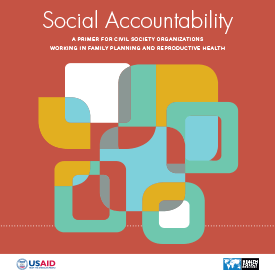The Health Policy Project ended in 2016. Work continued under Health Policy Plus (HP+) until 2022.
PUBLICATION
Author(s): Erin McGinn and Alyson Lipsky
Primary Language: English
Date: 9/15/2015
Abstract:
The right to freely and responsibly decide if, when, and how many children to have has been enshrined in numerous international treaties, conventions, and political consensus documents. Governments are obligated to manifest their international commitments to family planning and reproductive health and rights through their policies and funded programs, at the national, state/province, and local level. Yet the reality on the ground is that for most countries worldwide, from the least to the most developed countries, governments fail in many respects to operationalize these international commitments.
In recent years, the international development community has turned its attention to the role of accountability in achieving greater impact of development interventions.Social accountability is characterized primarily by the active involvement of citizens engaging with government decision-making processes to ensure government fulfills its commitments and implements policies and programs appropriately. While the FP/RH community has a long-standing commitment to advocacy and social mobilization to advance reproductive rights, some social accountability concepts and interventions are relatively new to the FP/RH community. This guidance document is a primer for CSOs working in health that are looking to initiate or expand activities aimed to hold government entities accountable for delivering on their national and international commitments related to family planning/reproductive health and rights.
This document provides:
-
An overview of current concepts of social accountability.
-
A synopsis of common methodologies and tools used by civil society to engage in social accountability.
-
Ideas and examples on how social accountability can be used to further FP/RH within a country.
-
Suggestions on what elements CSOs might take into consideration when deciding to implement a particular methodology
-
A selection of documents and resources that may be helpful in implementing social accountability activities.
Advocacy Best Practices Capacity Development Capacity Development Resource Civil Society Engagement Family Planning/Reproductive Health (FP/RH) FP2020/30 Governance, Stewardship & Accountability (GS&A) Health Systems Strengthening Non-Government/Community Service Org. (NGO/CSO) Policy Repositioning Family Planning Stakeholder Engagement


